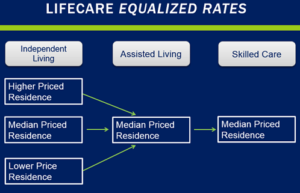Retirees who are considering a move to a continuing care retirement community (CCRC, also known as a life plan community) may feel overwhelmed by all of the contract types. Adding to the confusion, many CCRCs offer a variety of contract options. But you should know that there is a new spin on one contract type that many CCRCs are introducing, a life care contract with equalized pricing, which you may find appealing.
A concise overview of the traditional types of CCRC contracts
The following descriptions and analyses assume all other factors are more or less equal (for example, size of unit, services and amenities, location, etc.).
Lifecare (Type A): Essentially pre-paying for some portion of health-related services that may be needed in the future, this type of contract requires the highest monthly fee for residents who are still living independently and may also require a higher entry fee.
Modified (Type B): Offering a lower monthly fee than a lifecare contract and often a lower entry fee, this contract type usually includes most of the same residential services and amenities offered by a lifecare contract. However, if and when assisted living or skilled nursing care is needed, the resident will be financially responsible for some of the additional costs.
Fee-for-Service (Type C): This contract usually has the lowest monthly fees and often the lowest entry fees. While some or all of the same residential services and amenities will be provided, if assisted living or skilled nursing care is needed, the monthly fee will increase to reflect the market rate for care.
Rental: Usually having no entry fee or just a small “community fee,” rental contracts are frequently month-to-month, and since no funds are required up-front, the monthly service fee is often higher than in a comparable entry fee community. While rental contracts may provide “priority access” to the healthcare facility, it is not necessarily guaranteed access (as it usually is with entry fee providers). Assisted living and healthcare services are offered under a fee-for-service model, as described above.
A Twist on Lifecare: Equalized Pricing
The advantage that many seniors see in the lifecare contract is that almost all residential services and amenities, as well as health-related services (such as assisted living or skilled nursing care), are provided with little or no increase in monthly fees. Therefore, a lifecare contract ensures more predictable long-term expenses regardless of potential future healthcare needs.
Well, a growing number of CCRC providers are offering a new spin on the lifecare contract called equalized pricing. The overall concept is basically the same is with a standard lifecare contract: predictable lifetime expenses, regardless of the amount of care ultimately needed by the CCRC resident. However, the twist on the traditional Type A contract is that with equalized pricing, when a resident makes a permanent transfer to assisted living or skilled nursing care, they do not necessarily continue paying the same monthly rate they were paying in independent living. Instead, they begin paying what typically amounts to the median cost of all independent living residences within the community.
In short, this means that a resident who was in a lower priced (typically smaller) residence would pay more if assisted living or skilled nursing care services are required, but someone who was in a higher priced residence would actually pay less.

In the simplest terms, a CCRC lifecare contract that uses equalized rates could result in a resident paying more, or less, for care services, relative to the cost of their independent living residence. The effect is that it equalizes the cost of care for all residents. It is important to note that for couples the equalized rate could take effect for each resident separtely as they move from independent living to assisted living or skilled nursing care and this should be taken into account when planning for the long-term; particularly for those who choose to live in a lower cost independent living residence.

FREE Detailed Profile Reports on CCRCs/Life Plan Communities
Search Communities





